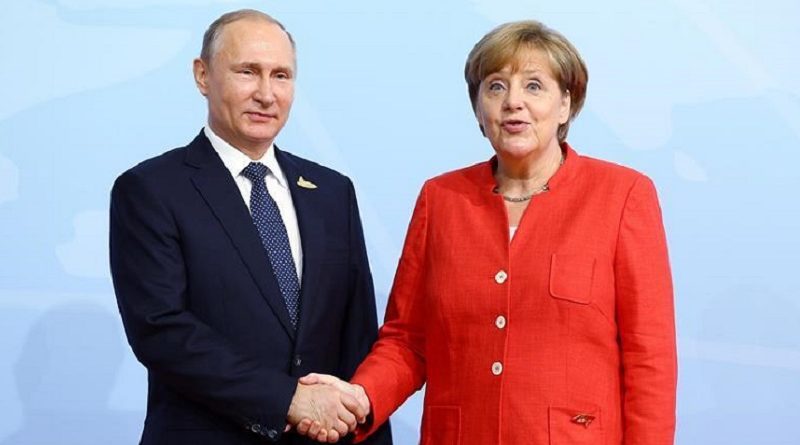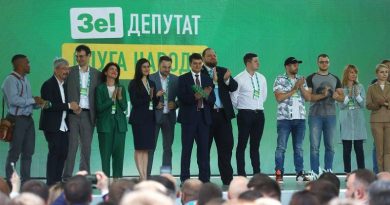Vladimir Putin’s useful idiots
In early May Russia’s ambassador to Germany threw a party to honour Soviet victory in the second world war. Guests at the embassy, a Stalin-era colossus that occupies more German territory than the nearby parliament building, included a host of dignitaries. The last boss of communist East Germany, Egon Krenz, now 86, mingled under the chandeliers with Gerhard Schröder, chancellor of united Germany from 1998 to 2005 (and, more recently, a lobbyist for Russian energy firms). Tino Chrupalla, co-leader of Alternative for Germany (AfD), a far-right party, sported a tie in the colours of the Russian Federation.
The event earned a bit of scorn in the German press, but little other notice. Seventeen months into Russia’s war on Ukraine public opinion here, as across Europe, overwhelmingly views Russia as an aggressor to be shunned, and Ukraine as a defender deserving help. Whatever their weight in the past, varied purveyors of Russian influence now stand diminished. Mr Schröder, for instance, chaired the board of the now-closed Nord Stream pipelines that addicted Germany to Russian gas. Last summer Russia shut the pipes, which mysterious saboteurs then blew up. The ex-chancellor has been bumped from clubs, disinvited from his Social Democratic Party’s functions (though he remains a party member), and stripped of government-provided office facilities. As for Mr Chrupalla, the AfD leader’s cosiness with Russia did not just annoy German tabloids. Leaked messages revealed dismay among his own party’s MPs.
Yet even if Russia’s effort to project persuasive power across Europe has not quite succeeded, neither has it completely failed. A subculture of what Germans dismiss as Putinversteher—sympathisers who “understand” the Russian leader Vladimir Putin—thrives outside the mainstream. Throughout Europe their whispering forms a leitmotif in the rumble of complaint about seemingly unrelated troubles such as inflation, crumbling public services, overbearing regulations and fears of immigration. The grumblers have only just begun to challenge the scale of their governments’ generosity to Ukraine, which by February this year amounted to more than €60bn ($65bn) in economic and military aid from Brussels and the EU’s individual members (and €70bn if Britain is added, a sum roughly equal to America’s contribution). But if Ukraine’s fight goes on too long or goes wrong, there are plenty waiting in the wings to take up the blame game.
The spectrum of Europe’s Useful Idiots, a cold-war term for unwitting allies of communism, is wide. In politics, parties on both the far right and far left disagree on much; but over Ukraine these extremes have often converged in demanding an instant “peace” that would in effect reward Russian aggression with land. In media and academe, intellectuals still seem happy to ignore evidence of Russia’s imperial intent and its drift into criminality, and instead bemoan European entanglement in what they parse as a proxy war between America and Russia, or perhaps, speculating more grandly still, between America and China. And in the world of business, despite multiple rounds of Western sanctions, Russia still has plenty of “friends” too.
Mr Putin’s enablers include several European governments. Viktor Orban, the prime minister of Hungary since 2010, has been the most obvious. The populist strongman has repeatedly criticised Western support for Ukraine and continued Hungary’s imports of Russian gas. His government also refuses to allow the transit of weapons given to Ukraine by Hungary’s fellow members of NATO and the EU. Next-door Austria has, more quietly but equally profitably, largely sat out the struggle, too, citing its non-membership of NATO and self-appointed role as a bridge between East and West, offering little aid to Ukraine even as its trade with Russia has surged.
Greece, another EU member, is complying with the EU’s sanctions, but has balked at tightening any further those on shipping Russian oil, perhaps because Greek firms happen to pocket so much from the trade. Only recently and under heavy American pressure did Cyprus, an offshore financial haven, shut down some 4,000 local bank accounts held by Russians. Facing less pressure, non-EU countries such as Turkey and Serbia don’t even bother to disguise the lucrative back-door service they provide to Russia.
Some countries have twisted seemingly noble intentions into policies that warm Mr Putin’s heart. Citing its vaunted neutrality, Switzerland has wielded arcane local laws to block the supply of arms to Ukraine, including 96 mothballed Leopard tanks sitting in Italy that happen to belong to a private Swiss firm. Scoring repeated own-goals with freedom of speech principles, police in Sweden have green-lighted public burnings of the koran. Not only has this hugely irked Muslim-majority Turkey, which wields a veto over Sweden’s bid to join NATO. Mr Putin himself gleefully trolled the Swedes. On a trip to Dagestan before the Eid holiday at the end of June, Mr Putin had himself filmed tenderly holding a koran, as he explained that under Russian law it is a crime to desecrate holy things.
Yet even solid-looking bricks in the would-be European wall of support for Ukraine can crumble. Slovakia, for instance, has been a vital conduit for Western aid and recently pledged its fleet of 13 Soviet-era Mig-29 fighter jets to the Ukrainian air force. But polls show that the party of Robert Fico, a Russophile leftist who has blamed “Ukrainian Fascists” for provoking Mr Putin, looks likely to win national elections scheduled for September.
France is a linchpin of both NATO and the EU. But a French parliamentary panel recently scolded Marine Le Pen, the closest challenger to President Emmanuel Macron in last year’s election, for parroting Russian propaganda following its annexation of Crimea in 2014. Ms Le Pen strenuously denies that her defence of Mr Putin had anything to do with the €9m in loans her party received that year from Russian-controlled banks. She has condemned Russia’s invasion of Ukraine, but last October, seven months into the war, she declared that sanctions on Russia are not working.
In Italy, although the hard-right prime minister, Giorgia Meloni, is a strong supporter of Ukraine, Matteo Salvini, who leads the second-biggest party in her coalition, is another opponent of sanctions and, at least up until the invasion, was a declared fan of Mr Putin’s.
Germany, like France, seems a strong pillar. Yet the AfD, bluntly described by the head of the country’s internal intelligence agency as a propagator of Russian narratives, has been surging in polls of voter intent. It is now in a dead tie for second place with the ruling Social Democrats. At the opposite political pole Sahra Wagenknecht, a telegenic leftist and at-all-costs-peacenik, says pollsters tell her she could win 19-30% of a German national vote. Although public support for helping Ukraine remains strong, the trend is drifting downwards.
Useful Idiot narratives are surprisingly resilient. Their main points—that NATO “provoked” Russia’s repeated attacks on and eventual invasion of Ukraine, that Ukraine is an artificial entity implanted on land that is rightfully Russia’s, and that America gleefully pours oil on this fire to sell weapons and sustain its global hegemony—echo in various ways. One is what Italians call benaltrismo or whataboutery: NATO attacked Serbia in 1999 and Libya in 2011, plus America invaded Iraq and Afghanistan, so what’s the big deal if Russia misbehaves? Another variety is dietrismo, the notion that there must be some “inside” story behind events: writing in the New Left Review Wolfgang Streeck, a German Sociologist, posits that the hidden purpose of the crisis is to set the stage for putting a fearful EU under the thumb of a pumped-up NATO.
What seems to link Europe’s far right, far left and “intellectual” opposition to Western policy is something simpler, however. It is a hoary, cold-war-style anti-Americanism. The East German-born Mr Chrupalla, for instance, insists the Amis have profited from Ukraine’s war by forcing Germany to switch from piped Russian natural gas to costlier liquified gas shipped from America. But this is a trap, he hints, because imported American energy is so much more expensive that German manufacturers will have to shift production to America. Ms Wagenknecht, his left-wing rival, believes that America forced the war on Russia by attempting to pull Ukraine into its “sphere of influence”.
At a recent political rally near Berlin Olaf Scholz, Germany’s chancellor, found himself heckled by a chorus of beefy peaceniks shouting “Warmonger!” Normally polite, soft-spoken and unflappable, Mr Scholz roared back into the microphone that it was Mr Putin who wanted to destroy and conquer Ukraine. “If you loudmouths had even a little bit of brain, you would know the real warmonger!”
The Ally of Executioners: Pushkin, Brodsky, and the Deep Roots of Russian Chauvinism
Is Russian Culture Responsible for “Putin’s war” in Ukraine?
Flirting with the Abyss: Russia’s Barbaric War and Crimes Against Humanity
Taking Pushkin off his pedestal
The “Victims of Tyranny” Narrative and the Silence about Russia’s War on Ukraine




